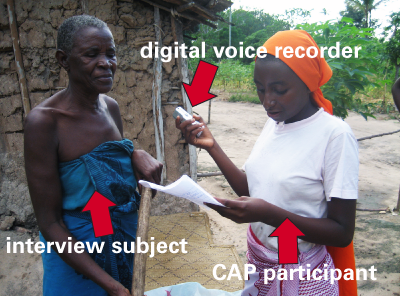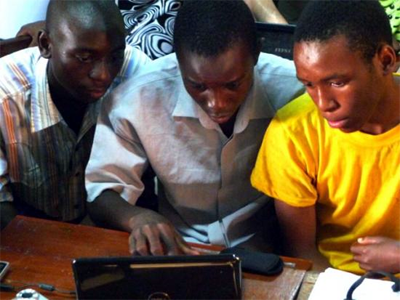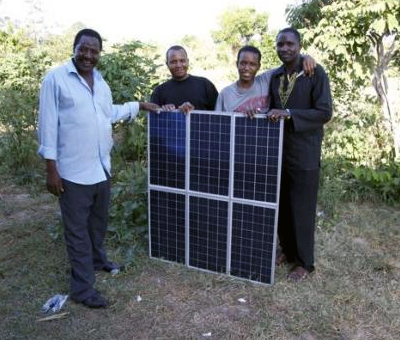Sean Hewens, founder of Smallbean, recently explained his project to Chris via a lengthy e-mail interview.
WHAT IS SMALLBEAN?
The Citizen Archivist Project (CAP) strives to bring technology and computer skills to various worldwide communities, and to enable subsequent job and economic growth. As part of CAP, Smallbean uses donated electronics and solar power to teach technological skills and document community life in those diverse locations.
CAP IN KWALA, TANZANIA
Recently, we operated in Kwala, Tanzania, a small village approximately three hours west of Dar es Salaam. We built a solar-powered technology lab containing 10 laptop computers, 10 cameras, 5 audio recorders, and a video camera. We conducted our two-week Citizen Archivist Project course, where students learned skills and collected oral histories, photographs and videos of life in Kwala. Below find a one-minute video summary of the experience:
CAP curriculum begins by teaching basic camera and interviewing skills. Once students have a handle on the cameras and audio recorders (kids everywhere grasp this stuff in about 38 seconds), they collect data from the village, and we teach Windows, Microsoft Word, typing skills, Picasa, iTunes, etc., via the uploading and processing of the photos / audio footage gathered. Most of the children have never touched a keyboard; we spent 45 minutes during one early class on double-clicking. Fast forward four weeks and the kids are sending emails and downloading music videos that crash their Internet.
We left with a superb collection of oral histories and supporting data (examples) that will be the first installment in the Digital Archive we are constructing in conjunction with academic institutions in Boston. In Kwala, both those from our Citizen Archivist Project and others in the school continue to take computer classes and document village life. A Smallbean staff member remains on site and our partner organization for the pilot (Newton-Tanzania Collaborative) has two full time staff members teaching at the school. Thus, we’ve been able to maintain a presence in Kwala and actively program at the site from the United States.
THE FOUNDING AND EARLY DAYS OF SMALLBEAN
In late 2008, I was working for the United Nations in Tanzania when the idea for Smallbean struck. I was an uninspired attorney at the time, though I’d begun taking graphic design classes in Boston at MassArt. The idea of starting a nonprofit appealed to me as it would combine the analytical side of my brain with marketing / creativity / and a thinking-outside-the-box way of doing things.
Begun with the idea that good electronic gadgets sit neglected in closets in the States, the Citizen Archivist Project developed as a solution to the question: “What is a productive reuse that retired cameras and iPods (as handheld digital recorders) could be put to in other locations around the world?” Capturing an oral history in Swahili of a 110 year-old Tanzanian lady is an amazing, productive reuse of old technology.
Our initial foray into gadget collection drives had problems. For every functioning camera received, we got many that were broken, obsolete, or not appropriate for transport to places like Tanzania. As we’re building solar powered labs, we need energy efficient computers. We brought ten refurbished Dell 10v’s to Kwala. These draw between 15 and 25 watts of energy and are roughly 3x as energy efficient as the average laptop, and 5-6x times more efficient than the early 2000’s laptops that were donated. We have passed re-donated a bunch of the in-kind donations that we received but weren’t able to use. However, we expended lots of resources acquiring much that was of no use to us.
THE FUTURE WITH SMALLBEAN
We will continue to use refurbished and donated electronics in our technology installations, though we are now more picky about the types of electronic donations that we take. It is hoped that based upon our success in Kwala, we’ll be able to team up with larger manufacturers or resellers to acquire cameras, laptops, and audio recorders. We hope that our message of “productive reuse” via a program like the Citizen Archivist Project will resonate with forward-thinking companies in the States.
We’ll be launching another CAP this summer, likely in Kenya, and at a series of rural libraries there. We intend to test our “CAP in a Bag” installations, which feature smaller, more portable solar and technology units. One initiative we’ll focus on is the collection of oral histories in some of the vast variety of tribal dialects present in East Africa. Due to the rise of Swahili and English (more so in Tanzania than Kenya) many tribal dialects will become dead languages in the next two generations.
ESCARGO is another project to be implemented, which in addition to conjuring images of French food, stands for “Excess Solar Capacity as A Revenue Generation Option”. We will install a computer lab with excess solar panels on the roof, perhaps installing 1000 watts though only 300 watts are needed to power the computer lab. This excess capacity can then be captured and sold. The hydroelectricity in countries like Tanzania and Kenya is expensive, unreliable and often non-existent. Organizations in East Africa are transporting and reselling smaller quantities of electricity using batteries. Our ESCARGO model would capture excess electricity in motorcycle-style 12 volt batteries. People could then use it to light their homes, charge cell phones, etc. We’re currently working with an NGO in Kenya to launch an ESCARGO pilot in early 2011.
WANT TO GET INVOLVED?
First: get excited about the Citizen Archivist Project! Smallbean collected amazing data in Kwala. The computer lab built at the school will pay fantastic dividends in the future, as will the solar power installation and the skills taught. Our students are passing along what they learned to a new set of students. Check out the photos on our website and, in the coming weeks, listen to the oral histories that we collected (we’re halfway through translating them from Swahili). As we look to launch the CAP around the world, if any readers know of any well-suited locations, contact Smallbean.
Like any nonprofit in this economy, we need monetary and in-kind support. CAP is a 501c3 nonprofit and all donations are tax deductible. In terms of in-kind donations, we desire functioning cameras and movie equipment. We also seek energy efficient laptops and iPod models with voice memo capability. If anyone thinks he or she has electronics to donate, contact Smallbean.
As mentioned, we are looking to partner with companies interested in donating used or refurbished electronics such as laptops, cameras, or audio recorders. Additionally, we hope to partner with companies in the alternative energy community interested in becoming involved with our solar installations in the developing world. To the extent that any reader knows someone able to assist Smallbean in this capacity, contact Smallbean.
Finally, spread the word! Tell everyone and anyone about Smallbean and CAP. Start like this: forward along our Kwala summary video, a quick three minutes that could change the world.
Leave a Reply
Tags: article, charity, Travel Websites





 Make Your Own Free Audio Books for your iPhone or iPad on a Mac
Make Your Own Free Audio Books for your iPhone or iPad on a Mac How to Protect Your Home When You Travel
How to Protect Your Home When You Travel 5 Important Technologies for Today’s Travelers
5 Important Technologies for Today’s Travelers Arlo – Wireless Indoor/Outdoor Cloud-Enabled Home Security System
Arlo – Wireless Indoor/Outdoor Cloud-Enabled Home Security System
